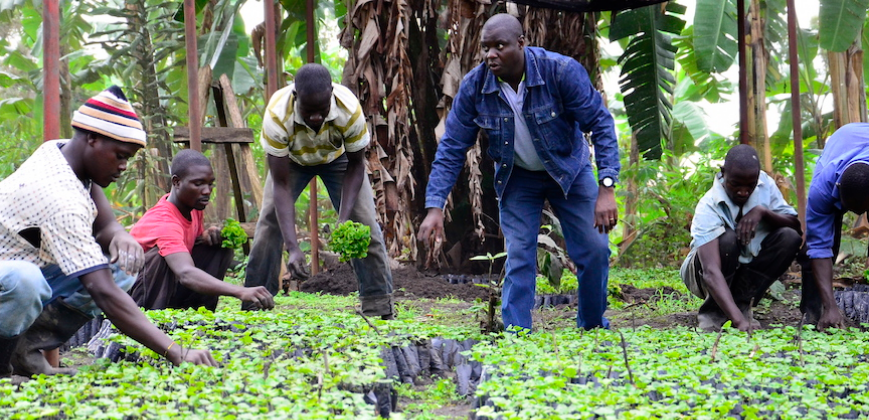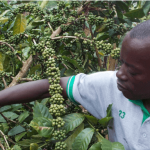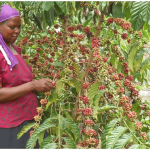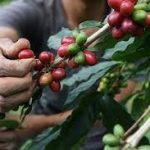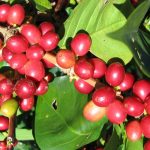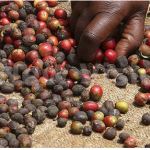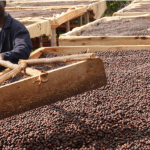I grew up on a coffee farm in Uganda, where I witnessed how much my parents had to toil to make money from coffee to pay school fees for my siblings and me. Known nationally as the main cash crop and foreign exchange earner in Uganda, coffee farming provided my family and others like it with far less than 5 percent of the retail value of coffee – less than US$1 a day – perpetuating generational abject poverty.
As I continued my studies and learned more about the global coffee trade, I discovered that coffee was the second most traded commodity in the world after oil. This raised many questions in my mind: Mainly, I wondered why such a lucrative commodity led to so much suffering among farming families while creating great wealth for those in trade and industry.
A Wide Spread Challebge In Agriculture – And A Potential Solution
I soon learned that the problem wasn’t limited to coffee: According to the International Labour Organization, over 220 million working people in sub-Saharan Africa live on only US $2 a day, the majority being involved primarily in agricultural production. And while agriculture is the dominant employer in Africa, involving over 60 percent of the population, agricultural value chains deprive farmers of over 95 percent of the retail value of their produce, leaving most of them unable to make savings, reinvestments and improvements in their livelihoods. The separation of agricultural production from value addition processes (e.g. hulling, grading, sorting, roasting, grinding, packaging and branding) cuts farmers off from the potentially significant profits that are achieved in the later stages of the value chain.
But I also learned that this challenge has a promising potential solution: Enhancing and expanding farmers’ roles and responsibilities along the commodity value chain can play a critical role in jump-starting economic transformation. In particular, investment in the commodity processing infrastructure – including equipment for coffee hulling, sorting, roasting and other processes – can lead to the development of farmer-owned agribusinesses that create both jobs and income. Owning these businesses could empower farmers to develop downstream agribusiness value addition services, as well as upstream activities (such as supplying inputs). It could also enhance their productivity while allowing them to operate in the most profitable value chains within a conducive policy environment.
Armed with this knowledge, after graduating with a bachelor of science in agriculture degree in 1999, I did not look for a job. Instead, I moved to the coffee farming communities and carried out a thorough problem analysis of the coffee value chain – from the farm to the cup – within and outside of Uganda.
ASSESSING THE PROBLEMS WITH COFFEE FARMING
While meeting with the farmers and assessing their needs, I asked them about coffee prices – and none of them could tell me the price of coffee. Farmers were not taking care of the quality and productivity of their operations. Coffee production was declining. Farmers were not making investments in value addition and were not even consuming their own coffee. They were selling coffee on trees, rather than after harvest. They did not have enough money to grow and add value to their coffee farms – and they could not afford to borrow money at the 25-30 percent interest rates charged by local lenders.
What’s more, these farmers were not active participants in the formulation of policies and programs related to coffee production and trade. They were not organized into any form of institution, as the cooperative movement had collapsed in 1990 when the Ugandan government liberalized the marketing of coffee, which ushered in fierce competition from many individual private corporations. Due to these factors, farmers did not have ownership of their crops – they were only spectators, or at best custodians of the coffee. And to make matters worse, they were not taking action to change this dynamic.
A NEW APPROACH FOR COFFEE FARMERS
In response to these issues, I founded NUCAFE (National Union of Coffee Agribusinesses and Farm Enterprises) to serve as a farmer-owned and operated association for Uganda’s coffee farmers. I felt that farmers needed to own their coffee and take responsibility for their own actions: Since no one was coming to help them, they needed to become masters of their own destiny.
My next move was to empower coffee farmers by organizing them into their own rural farmer associations and cooperatives. Between 2003 and the end of 2010, we organized 151 community farmer associations and cooperatives with over 800,000 individual farmers representing 150,000 farming families. With the critical mass of these farmer associations, we started empowering them to become business and export ready. We were able to partner with an Italian coffee roasting company called Caffe River, with which NUCAFE piloted the farmer ownership model.
Through this model, organizations like NUCAFE do not take over ownership of coffee from farmers. Instead, NUCAFE acts as a facilitator, providing farmers with the necessary services and facilities to successfully market their coffee, in exchange for a service fee that normally amounts to less than 1 percent of the value of the coffee processed and marketed. This has aligned the interests of both sides, as the organization strives to maximize returns to the farmers, and in the process grows its own income.
The model was met with early success, with an increase in farmers’ sale price of more than 30 percent per kilogram of graded green coffee. Between 2013 and 2015, farmers working through NUCAFE made investments worth over US $5 million into factory infrastructure for processing, roasting and packaging coffee, along with farmer cooperative development. However, we’ve also faced challenges: For instance, operationalizing the factory was difficult, as NUCAFE was not getting enough working capital to ensure that farmers could meet their immediate cash flow needs.
NEW FINANCE LEADS TO NEW OPPORTUNITIES
At the beginning of 2016, I won the Miller Center for Social Entrepreneurship’s Global Social Benefit Institute (GSBI) fellowship, which helped me to prepare an impact investor-friendly business plan deck. The business plan deck helped us to attract relatively cheaper working capital, bringing the interest rate for this financing down from as high as 25-30 percent to 14 percent per year. Thanks to both foreign and local financing, our farmers’ income has increased by at least 250 percent per kilogram of graded green coffee, and at least 900 percent for roasted and ground coffee. Today, NUCAFE has increased its membership to 200 community farmer associations and cooperative enterprises including over 1.2 million smallholder coffee farmer entrepreneurs.
Taking ownership has also encouraged farmers to develop their policy advocacy capacity, and as a result, NUCAFE managed to influence the government of Uganda to formulate the country’s first ever National Coffee Policy. The policy empowers farmers to own their coffee, create shared value, take charge of their own affairs and compassionately produce coffee that is socially and environmentally friendly.
Now, the farmer ownership model is ready for upscaling. First, I have created a consortium with NUCAFE, Makerere University and the National Agricultural Research Organization. With this consortium, I have also founded an agribusiness incubator called CURAD, which has supported the creation of over 120 startups, currently employing over 3,000 youths. We have also influenced and supported reforms in the curricula of Makerere University for BSc and MSc degree programs, encouraging them to be more entrepreneur-oriented.
NEXT STEPS FOR THE FARMER OWNERSHIP MODEL
The farmer ownership model is about unlocking the tremendous economic potential of agricultural commodities, to give farmers a chance to move out of generational poverty and engage at higher levels of the agricultural commodity value chain. The model not only increases incomes, as seen above, it also brings fairness and equitable power relations to the value chain. It involves private individual commodity processors through a new, win-win relationship with farmers: Instead of buying raw agricultural produce at low prices and selling it on to the next player in the chain, these processors offer their value addition expertise and facilities to farmers at a fee. In doing so, processors enjoy higher operational capacity of their processing equipment and increased revenue. Simultaneously, this value addition allows farmers to retain ownership to sell a more valuable form of product that earns a higher return on the market.
The farmer ownership model is rapidly liberating Ugandan farmers from generational poverty. And Uganda’s coffee production is on the rise: Exports have grown from only 3.2 million 60kg bags of green coffee in 2016/2017 to 4.6 million 60kg bags in 2017/2018, according to the Uganda Coffee Development Authority.
I am very grateful to all the partners who have helped me to pilot and grow the model that has propelled millions of smallholder farmers out of poverty, making NUCAFE into Uganda’s largest entrepreneur-creating organization in the coffee value chain. I look forward to the ongoing consolidation, deepening and upscaling of our approach within Uganda, and hope the farmer ownership model will spread to other countries in the developing world, especially in Africa.

